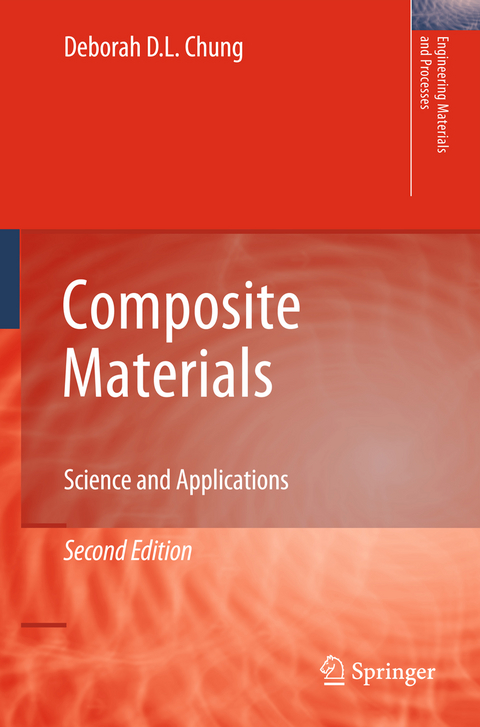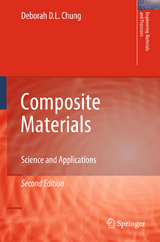Composite Materials
Science and Applications
Seiten
2010
|
2nd ed. 2010
Springer London Ltd (Verlag)
978-1-84882-830-8 (ISBN)
Springer London Ltd (Verlag)
978-1-84882-830-8 (ISBN)
The first edition of "Composite Materials" introduced a new way of looking at composite materials. This second edition expands the book's scope to emphasize application-driven and process-oriented materials development. The approach is vibrant yet functional.
The ?eld of composite materials has progressed greatly over the last few decades, as shown by the widespread use of ?brous composite - terials for airframes, sporting goods and other lightweight structures. Enabling this technological progress is scienti?c understanding of the design and mechanics of composite materials that involve continuous ?bers as the reinforcement. Current challenges in the ?eld of composite materials are associated with the extension of the ?eld of composite materials from structural composites to functional and multifunctional composites, the dev- opment of composite materials for electrical, thermal and other fu- tional applications that are relevant to current technological needs, and the improvement of composite materials through processing. Ex- ples of functions are joining (e. g. , brazing), repair, sensing, actuation, deicing (as needed for aircraft and bridges), energy conversion (as needed to generate clean energy), electrochemical electrodes, el- trical connection, thermal contact improvement and heat dissipation (i. e. , cooling, as needed for microelectronics and aircraft).
Processing includes the use of additives (which may be introduced as liquids or solids), the combined use of ?llers (including discontinuous ones) at the micrometer and nanometer scales, the formation of hybrids (such as organic-inorganic hybrids), the modi?cation of the interfaces in a composite, and control over the microstructure. In other words, the development of composite materials for current technological needs must be application driven and process oriented. This is in contrast to the conventional composites engineering approach, which focuses on mechanics and purely structural applications.
The ?eld of composite materials has progressed greatly over the last few decades, as shown by the widespread use of ?brous composite - terials for airframes, sporting goods and other lightweight structures. Enabling this technological progress is scienti?c understanding of the design and mechanics of composite materials that involve continuous ?bers as the reinforcement. Current challenges in the ?eld of composite materials are associated with the extension of the ?eld of composite materials from structural composites to functional and multifunctional composites, the dev- opment of composite materials for electrical, thermal and other fu- tional applications that are relevant to current technological needs, and the improvement of composite materials through processing. Ex- ples of functions are joining (e. g. , brazing), repair, sensing, actuation, deicing (as needed for aircraft and bridges), energy conversion (as needed to generate clean energy), electrochemical electrodes, el- trical connection, thermal contact improvement and heat dissipation (i. e. , cooling, as needed for microelectronics and aircraft).
Processing includes the use of additives (which may be introduced as liquids or solids), the combined use of ?llers (including discontinuous ones) at the micrometer and nanometer scales, the formation of hybrids (such as organic-inorganic hybrids), the modi?cation of the interfaces in a composite, and control over the microstructure. In other words, the development of composite materials for current technological needs must be application driven and process oriented. This is in contrast to the conventional composites engineering approach, which focuses on mechanics and purely structural applications.
Deborah D.L. Chung is Professor in the Department of Mechanical and Aerospace Engineering at the University of Buffalo, USA. She has a PhD in Materials Science from the Massachusetts Institute of Technology, USA.
Composite Material Structure and Processing.- Carbon Fibers and Nanofillers.- Mechanical Properties.- Durability and Degradation of Materials.- Materials for Lightweight Structures, Civil Infrastructure, Joining and Repair.- Tailoring Composite Materials.- Electrical Properties.- Thermal Properties.
| Erscheint lt. Verlag | 29.3.2010 |
|---|---|
| Reihe/Serie | Engineering Materials and Processes |
| Zusatzinfo | 210 Illustrations, black and white; 371 p. 210 illus. |
| Verlagsort | England |
| Sprache | englisch |
| Maße | 155 x 235 mm |
| Themenwelt | Naturwissenschaften ► Chemie ► Technische Chemie |
| Naturwissenschaften ► Physik / Astronomie ► Festkörperphysik | |
| Technik ► Maschinenbau | |
| ISBN-10 | 1-84882-830-6 / 1848828306 |
| ISBN-13 | 978-1-84882-830-8 / 9781848828308 |
| Zustand | Neuware |
| Informationen gemäß Produktsicherheitsverordnung (GPSR) | |
| Haben Sie eine Frage zum Produkt? |
Mehr entdecken
aus dem Bereich
aus dem Bereich
Daten, Formeln, Normen, vergleichende Betrachtungen
Buch | Softcover (2024)
Europa-Lehrmittel (Verlag)
CHF 56,90
Von der Theorie zur Anwendung
Buch | Hardcover (2025)
Hanser (Verlag)
CHF 55,95




